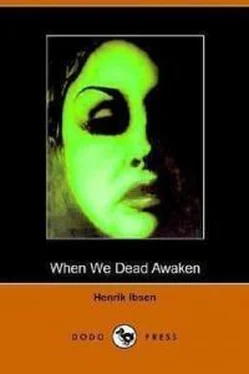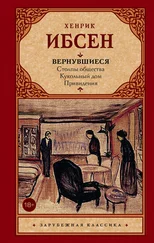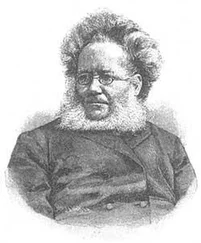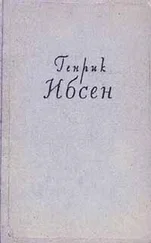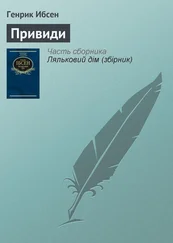Генрик Ибсен - When We Dead Awaken
Здесь есть возможность читать онлайн «Генрик Ибсен - When We Dead Awaken» весь текст электронной книги совершенно бесплатно (целиком полную версию без сокращений). В некоторых случаях можно слушать аудио, скачать через торрент в формате fb2 и присутствует краткое содержание. Год выпуска: 2014, Издательство: epubBooks Classics, Жанр: Драматургия, на английском языке. Описание произведения, (предисловие) а так же отзывы посетителей доступны на портале библиотеки ЛибКат.
- Название:When We Dead Awaken
- Автор:
- Издательство:epubBooks Classics
- Жанр:
- Год:2014
- ISBN:нет данных
- Рейтинг книги:3 / 5. Голосов: 1
-
Избранное:Добавить в избранное
- Отзывы:
-
Ваша оценка:
- 60
- 1
- 2
- 3
- 4
- 5
When We Dead Awaken: краткое содержание, описание и аннотация
Предлагаем к чтению аннотацию, описание, краткое содержание или предисловие (зависит от того, что написал сам автор книги «When We Dead Awaken»). Если вы не нашли необходимую информацию о книге — напишите в комментариях, мы постараемся отыскать её.
When We Dead Awaken — читать онлайн бесплатно полную книгу (весь текст) целиком
Ниже представлен текст книги, разбитый по страницам. Система сохранения места последней прочитанной страницы, позволяет с удобством читать онлайн бесплатно книгу «When We Dead Awaken», без необходимости каждый раз заново искать на чём Вы остановились. Поставьте закладку, и сможете в любой момент перейти на страницу, на которой закончили чтение.
Интервал:
Закладка:
IRENE.
I hated you, because you could stand there so unmoved—
PROFESSOR RUBEK.
[Laughs.] Unmoved? Do you think so?
IRENE. —at any rate so intolerably self–controlled. And because you were an artist and an artist only—not a man! [Changing to a tone full of warmth and feeling.] But that statue in the wet, living clay, that I loved—as it rose up, a vital human creature, out of those raw, shapeless masses—for that was our creation, our child. Mine and yours.
PROFESSOR RUBEK.
[Sadly.] It was so in spirit and in truth.
IRENE.
Let me tell you, Arnold—it is for the sake of this child of ours that I have undertaken this long pilgrimage.
PROFESSOR RUBEK.
[Suddenly alert.] For the statue's—?
IRENE.
Call it what you will. I call it our child.
PROFESSOR RUBEK.
And now you want to see it? Finished? In marble, which you always thought so cold? [Eagerly.] You do not know, perhaps, that it is installed in a great museum somewhere—far out in the world?
IRENE.
I have heard a sort of legend about it.
PROFESSOR RUBEK.
And museums were always a horror to you. You called them grave–vaults—
IRENE.
I will make a pilgrimage to the place where my soul and my child's soul lie buried.
PROFESSOR RUBEK.
[Uneasy and alarmed.] You must never see that statue again! Do you hear, Irene! I implore you—! Never, never see it again!
IRENE.
Perhaps you think it would mean death to me a second time?
PROFESSOR RUBEK.
[Clenching his hands together.] Oh, I don't know what I think.—But how could I ever imagine that you would fix your mind so immovably on that statue? You, who went away from me—before it was completed.
IRENE.
It was completed. That was why I could go away from you—and leave you alone.
PROFESSOR RUBEK.
[Sits with his elbows upon his knees, rocking his head from side to side, with his hands before his eyes.] It was not what it afterwards became.
IRENE.
[Quietly but quick as lightning, half–unsheathes a narrow–bladed sharp knife which she carried in her breast, and asks in a hoarse whisper.] Arnold—have you done any evil to our child?
PROFESSOR RUBEK.
[Evasively.] Any evil?—How can I be sure what you would call it?
IRENE.
[Breathless.] Tell me at once: what have you done to the child?
PROFESSOR RUBEK.
I will tell you, if you will sit and listen quietly to what I say.
IRENE.
[Hides the knife.] I will listen as quietly as a mother can when she—
PROFESSOR RUBEK.
[Interrupting.] And you must not look at me while I am telling you.
IRENE.
[Moves to a stone behind his back.] I will sit here, behind you.—Now tell me.
PROFESSOR RUBEK.
[Takes his hands from before his eyes and gazes straight in front of him. When I had found you, I knew at once how I should make use of you for my life–work.
IRENE.
"The Resurrection Day" you called your life–work.—I call it "our child."
PROFESSOR RUBEK.
I was young then—with no knowledge of life. The Resurrection, I thought, would be most beautifully and exquisitely figured as a young unsullied woman—with none of our earth–life's experiences—awakening to light and glory without having to put away from her anything ugly and impure.
IRENE.
[Quickly.] Yes—and so I stand there now, in our work?
PROFESSOR RUBEK.
[Hesitating.] Not absolutely and entirely so, Irene.
IRENE.
[In rising excitement.] Not absolutely—? Do I not stand as I always stood for you?
PROFESSOR RUBEK.
[Without answering.] I learned worldly wisdom in the years that followed, Irene. "The Resurrection Day" became in my mind's eye something more and something—something more complex. The little round plinth on which your figure stood erect and solitary—it no longer afforded room for all the imagery I now wanted to add—
IRENE.
[Groped for her knife, but desists.] What imagery did you add then? Tell me!
PROFESSOR RUBEK.
I imagined that which I saw with my eyes around me in the world. I had to include it—I could not help it, Irene. I expanded the plinth—made it wide and spacious. And on it I placed a segment of the curving, bursting earth. And up from the fissures of the soil there now swarm men and women with dimly–suggested animal–faces. Women and men—as I knew them in real life.
IRENE.
[In breathless suspense.] But in the middle of the rout there stands the young woman radiant with the joy of light?—Do I not stand so, Arnold?
PROFESSOR RUBEK.
[Evasively.] Not quite in the middle. I had unfortunately to move that figure a little back. For the sake of the general effect, you understand. Otherwise it would have dominated the whole too much.
IRENE.
But the joy in the light still transfigures my face?
PROFESSOR RUBEK.
Yes, it does, Irene—in a way. A little subdued perhaps—as my altered idea required.
IRENE.
[Rising noiselessly.] That design expresses the life you now see, Arnold.
PROFESSOR RUBEK.
Yes, I suppose it does.
IRENE.
And in that design you have shifted me back, a little toned down—to serve as a background–figure—in a group.
[She draws the knife.
PROFESSOR RUBEK.
Not a background–figure. Let us say, at most, a figure not quite in the foreground—or something of that sort.
IRENE.
[Whispers hoarsely.] There you uttered your own doom.
[On the point of striking.
PROFESSOR RUBEK.
[Turns and looks up at her.] Doom?
IRENE.
[Hastily hides the knife, and says as though choked with agony.] My whole soul—you and I—we, we, we and our child were in that solitary figure.
PROFESSOR RUBEK.
[Eagerly, taking off his hat and drying the drops of sweat upon his brow.] Yes, but let me tell you, too, how I have placed myself in the group. In front, beside a fountain—as it were here—sits a man weighed down with guilt, who cannot quite free himself from the earth–crust. I call him remorse for a forfeited life. He sits there and dips his fingers in the purling stream—to wash them clean—and he is gnawed and tortured by the thought that never, never will he succeed. Never in all eternity will he attain to freedom and the new life. He will remain for ever prisoned in his hell.
IRENE.
[Hardly and coldly.] Poet!
PROFESSOR RUBEK.
Why poet?
IRENE.
Because you are nerveless and sluggish and full of forgiveness for all the sins of your life, in thought and in act. You have killed my soul—so you model yourself in remorse, and self–accusation, and penance—[Smiling.] —and with that you think your account is cleared.
PROFESSOR RUBEK.
[Defiantly.] I am an artist, Irene. And I take no shame to myself for the frailties that perhaps cling to me. For I was born to be an artist, you see. And, do what I may, I shall never be anything else.
IRENE.
[Looks at him with a lurking evil smile, and says gently and softly.] You are a poet, Arnold. [Softly strokes his hair.] You dear, great, middle–aged child,—is it possible that you cannot see that!
PROFESSOR RUBEK.
[Annoyed.] Why do you keep on calling me a poet?
IRENE.
[With malign eyes.] Because there is something apologetic in the word, my friend. Something that suggests forgiveness of sins—and spreads a cloak over all frailty. [With a sudden change of tone.] But I was a human being—then! And I, too, had a life to live,—and a human destiny to fulfil. And all that, look you, I let slip—gave it all up in order to make myself your bondwoman.—Oh, it was self–murder—a deadly sin against myself! [Half whispering.] And that sin I can never expiate!
[She seats herself near him beside the brook, keeps close, though unnoticed, watch upon him, and, as though in absence of mind, plucks some flowers form the shrubs around them.
Читать дальшеИнтервал:
Закладка:
Похожие книги на «When We Dead Awaken»
Представляем Вашему вниманию похожие книги на «When We Dead Awaken» списком для выбора. Мы отобрали схожую по названию и смыслу литературу в надежде предоставить читателям больше вариантов отыскать новые, интересные, ещё непрочитанные произведения.
Обсуждение, отзывы о книге «When We Dead Awaken» и просто собственные мнения читателей. Оставьте ваши комментарии, напишите, что Вы думаете о произведении, его смысле или главных героях. Укажите что конкретно понравилось, а что нет, и почему Вы так считаете.
